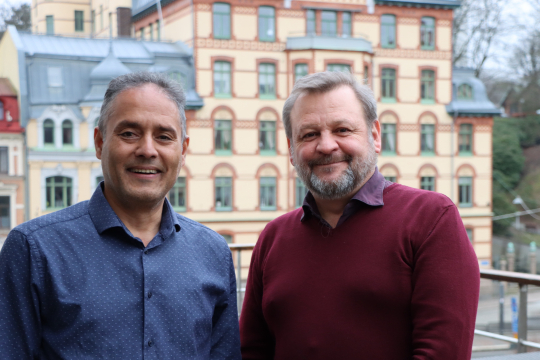EfD, along with partners, has been working intensely for a year and a half to develop a research agenda that will support a low-carbon transition in the Global South. Bhim Adhikari, Senior Program Specialist at the funding partner IDRC, recently visited EfD Global Hub to talk about the project.
The effects of climate change strike hard on the Global South. A transition to a low-carbon economy is urgent and demands capacity building among all stakeholders. EfD has received funding from Canada's International Development Research Centre (IDRC) for a study to identify high-impact research areas and knowledge gaps for achieving an inclusive low-carbon transition in the Global South. EfD with partners was selected to manage this extensive project which has a budget of 1.2 million CAD.
Why put so much effort and money into compiling a research agenda?
“Both IDRC and EfD see a low-carbon transition as a knowledge-intensive process. IDRC is not just a research funding organization. We bring networks together to build a more sustainable and inclusive world and we contribute with our expertise in many different ways. Our work is guided by a 10-year strategic plan that is based on consultations and workshops, with Canadian and Global South stakeholders. This informs us where the most urgent development challenges lie. But we have never done it on such a big scale as in this project. This project is unique.”
Why did you choose EfD for this task?
“There are many reasons! EfD is an impressive global capacity-building network with a strong foothold in the Global South. You have also been around for a long time, and we have had good experiences working with EfD.
You have many quality researchers, many of them trained at the University of Gothenburg which is one of the prime academic institutions in environmental economics. You have a lot of experience in research-to-policy interaction. EfD’s collaborative programs are very relevant to us. For this project, you brought in WRI, IIED, and other experts to the team. The fact that this project is very “south-driven” was also important, as well as the inclusion of a strong gender perspective in your overall research design.”
How would you describe the status of the project right now?
“It’s going very well and the project is on the right track. This is a huge undertaking and there has been an enormous amount of work done in only 18 months. Most working papers have been finalized. We’re now working on sharpening the document, synthesizing, prioritizing, finding the low-hanging fruits where we can have the most impact, etc.
What happens next?
“We will have validation workshops during the first two weeks of March in Vietnam, Colombia, and South Africa. There will be representatives from many stakeholder groups, such as government officials, policy think tanks, NGOs, the private sector, multilateral agencies, African development banks, and many more. We will hear what they think about the areas that EfD has identified. They will all contribute with input to the final product.”
What exactly is the final product?
“First of all, there is a synthesis document, that will guide our research agenda, and also other donors, who are interested in research initiatives to support a low-carbon transition in the Global South. It's an open-source document so anyone who wishes will be able to access it.
We will develop partnerships with other funding institutions. Sida and IDRC can of course not solve those global problems alone.
In addition, we aim to produce some high-level policy briefs aimed at policymakers. That was not part of the initial plan, but both EfD and IDRC were flexible when we saw the opportunity to add some extra value to this project. A book project is also a possible outcome.”
“This is really the beginning of a journey, not the end.”
By: Petra Hansson
